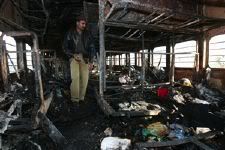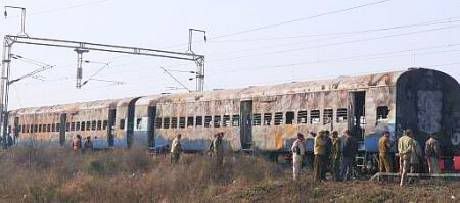Adil Najam
In a tragic development – and what is clearly the most serious threat to recent headways in the India-Pakistan peace process – a train bound from India to Pakistan (Samjhota Express) caught fire, reportedly because of two crude home-made bombs which exploded. Over 60 people are reported dead, most of them Pakistanis returning home, but the death toll also includes many Indians, including some Indian officials.


Here are some details, according to the BBC:
At least 64 people have been killed in a series of explosions and a fire on a Pakistan-bound train in the northern Indian state of Haryana, officials say. Passengers reported hearing two blasts as the train passed near Panipat, about 80km (50 miles) north of Delhi. The train – the Samjhauta Express – was part of a service taking passengers from Delhi to Lahore in Pakistan. A spokesman for Indian Prime Minister Manmohan Singh said the explosions were probably an “act of terror”. A number of other passengers were injured, and officials say the death toll may rise. The Samjhauta Express is one of two train services connecting India and Pakistan. After a two-year gap, it was reopened in 2004 as part of the peace process between the two countries.
Bloomberg adds the following information:
The blasts, which occurred after 11 p.m. last evening, were caused by crude explosives and struck two coaches of the train, India’s Railways Minister Lalu Prasad told reporters today in a televised interview in New Delhi. Pakistan condemned the blasts, saying India must conduct a thorough investigation into the act of terrorism. The train service between Indian and Pakistan is used by people who can’t afford air travel between the nuclear-armed neighbors that fought three wars since independence from British rule in 1947 and started talks to improve relations in 2003. The divided Himalayan territory of Kashmir is at the center of a dispute between the two countries that claim the region in full….
“Preliminary investigations show most of the victims are Pakistanis,” Pakistan’s foreign ministry spokeswoman Tasnim Aslam said in a phone interview from capital Islamabad today. “We expect India to conduct a thorough inquiry to find out the reasons behind this act.” The Pakistan High Commission in the Indian capital is being informed about possible casualties, zonal railways official B.N. Mathur said. A railway guard manning a signal cabin on the route between Delhi and Attari heard two explosions when the train crossed the station near Panipat, a refinery town, Mathur told reporters from the blast site….
India had the responsibility of providing security to the train in its part of the country, Aslam said, refusing to comment on the impact of the blasts on peace talks between the two countries. “We don’t know the motive behind the blasts.”

Pakistan has recently seen a spate of bombings in its major cities, and even before this some in government were pointing towards a ‘foreign hand’ in these bombings. Both countries have long played this game of ‘blame the foreign hand’, including in the recent tragic train bombings in Mumbai. The impulse to do so at the first sign of trouble is a natural one in the sub-continent. Given the deep distrust that exists between the two, it may even be understandable. But irrespective of the short-term political gains such finger-pointing might gain, it is not a very useful way to deal with deep tensions. One certainly hopes that this will not slide to that level and if, indeed, the purpose of those who did this terrible act was to hurt the peace process, then both countries will work together to make sure that this does not happen.
It is a good sign that Pakistan has announced that the visit by the Pakistan Foreign Minister to India will not be canceled. The signals from the Pakistan Foreign Ministry are sober but reasonable. According to The News:
Pakistan Foreign Minister Khurshid Kasuri Monday condemned a train blast in India which killed at least 66 people as a “horrendous act of terrorism” and said most of the victims were Pakistanis. Kasuri said he had asked the Indian government to investigate the incident overnight on a Samjhota Express. “It is a horrendous act of terrorism,” Kasuri told reporters during a function at the foreign office. “I would like the Indian government to investigate this incident. We are waiting for the results of the investigation,” he said. The minister said he had instructed the Pakistani High Commission in New Delhi to send staff to the site to help Pakistan nationals caught up in the blast.
The main leaders in India, including the Prime Minister and President, have also sent the right signals, including condolences to those who have died. The overtures from both sides are to focus on finding the terrorists who committed this atrocity. One hopes that their attentions will remain focussed on this purpose rather than succumbing to the impulse of scoring political points through the unwarranted politics of incrimination. Most of all, one hopes that neither country will allow the peace process to be derailed by this blast.




















































Even though I initially thought this might be anyone’s doing, after reviewing all the circumstances surrounding the incident, I’m convinced (and that’s just an opinion) that Hindu extremists are behind this tragedy. My rationale is two fold: for one it happened so close to the five year anniversay of the Gujrat calamity; secondly the materials used create the situation were meant to start a fire (and not to create an explosion), so as to mimic the the tragedy of 2002.
That being said, people who are trying to equate the Islamic terrorism versus terrorism in general, in my opinion, reveal an utter lack of perspective. Islamic terrorism is institutionalized, it is preached and practiced by mainstream religious and political parties, it is supported by religious texts and it has been adopted as State Policy by various muslim countries from time to time.
To compare that to some shady organization or a group of individuals operating in shadows with their own agenda is short-sighted, to say the least.
There is more to it than just the origin of terror stories in Pakistan. Pakistan has also become a convenient whipping boy for everyone involved in the region to blame their glaring misdeeds on.
India: blame Pakistan by raising the bogie of cross-bordor terrorism instead of resolving Kashmir and mustering the moral courage to admit that India had no right to be in Kashmir in the first place.
US and Britain: quite well known except the following (which is actually quite important):
http://ist-socrates.berkeley.edu/~pdscott/q7.html
Afghanistan: it’s well known that the present set up in Afghanistan is dominated by war lords, but why not conveniently blame it all on Pakistan?
Pakistan’s own political opposition: just listen to BB talking about Pakistan on foreign soil when she is out of power.
Then of course, there is a major difference between how Pakistanis and Indians conduct themselves abroad (the way they talk about their own country and the image they convey)
Eidee Man and others sharing his opinion:
The irresponsibility and sensational style of Indian media (much more so online) cannot be defended. I hate them as much for it as anyone else.
They tend to pander to the anti-Pakistan sentiment. I think thats because a generation of people have now been brought up on the Kashmir “low-intensity” warfare, which across the board, in India, is seen as a sponsored war on Pakistan’s behalf. (Kargil is the icing on the cake). Maybe naively, but the most common response to this has always been: why doesn’t this country leave us alone? Now, you can imagine the glee when the world finally ‘wakes’ up Pakistan and its ‘terror’. In this environment, its easy for newspapers to sensationalize and sell to people who are in a ‘I told you so’ state.
On your grievance about Pakistan featuring prominently in terror stories, world-wide: simply, too many stories link back to Pakistan. Let me list – Taleban’s roots and support in their push to caputure Afgh in the 90s. OBL disappears in the border areas. 9-11 operatives leads – some – end up in Pak. 7/7 London bombers Pak origins. Militant groups waging war in Kashmir like LeT and Jaish. AQKhan and nuclear proliferation. Daniel Pearl.
Does this mean Pakistani citizens are actively engaged in grooming and supporting these bad guys? Obviously not. But people will wonder why a country is so central to the banner issue of our times. Maybe its just one or two corrupt institutions or even a few corrupt individuals that are responsible. But the public at large doesn’t care about the details right? They only care that Pakistan is connected to these elements. Why its connected is the million dollar question for you. A billion dollar question is what can be done?
Another very important reason that adds to all this: the perception of acting out of turn. Example is British Pakistani lads, who have nothing to do with Iraq, blowing up people. If a Hindu from the US starts blowing up things in America cos some Hindu got lynched in the UK, then it wont take long for India to acquire a reputation either. (I realise that America and states acting out of turn exists — but its a whole another topic, lets not go there)
In my view “mental infetility” is the clearly the product of mental infirmity.
Dear Adnan Siddiqui,
“Never argue with a fool, he will lower you to his level”
Yes someone- I think it was MU on the freedom fighter board- did advise along those lines while persuading me against arguing with you. However, I cannot sit around and let you make a mockery of commonsense, as is your wont.
As for personal attacks, while your posts are littered with those, please note I have refrained from stooping to your level. I do want to be enlightened how you came to the wonderful conclusion that those who kill people indiscriminately through terrorism are the same as those who fight with the pen. Now this I have got to read.